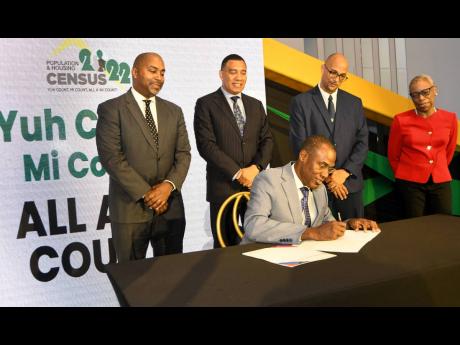Census 2022 to focus on community access to IT
Finance Minister Dr Nigel Clarke has signed off on new regulations for conducting census 2022, which will see a greater focus on digital data collection, and questions on community access to information technology.
As such, the 2022 census, which will begin on September 13 through to December 2022, will be conducted with regulations differing from previous censuses in areas such as means of data collection, the set of questions to be asked, and the division of geographical units.
Minister Clarke, who has responsibility for the Statistical Institute of Jamaica ((STATIN), signed the Census Order and the Census Regulations 2022, bringing into effect and legalising Jamaica’s 15th Population and Housing Census.
The signing took place at the official launch of the 2022 census, held on August 10 at the AC Marriott hotel in Kingston.
In support of the updated regulations, Clarke noted that as Jamaica seeks to become a more digital society, the use of digital devices to conduct this year’s census was a significant step, as well as the collection of information related to information and communication technology (ICT).
“As Jamaica moves towards a digital society, understanding the distribution, prevalence and use of ICT in the country will be abundantly important. This data will be fundamentally useful and instructive as we go through the task of digitising our society and ensuring that no person is left behind,” he said.
Speaking at the launch event, Director General of STATIN, Carol Coy noted that this year, the census questionnaires have been updated to collect data on the availability of information and communication technology at the community level, and outlined the rationale.
“During the period of online education, we saw that policymakers were not fully equipped with information about which communities had access to ICT. So, data on the availability of ICT at the community level will be very important for planning, especially within the education sector,’ she said.
Also speaking at the launch, Prime Minister Andrew Holness urged citizens to accommodate the census takers to allow for a seamless data-collection process, as this data will be of benefit to all Jamaicans.
“If we are going to implement policies on behalf of the people, we cannot make them based on emotion, or what we feel is popular. We have to make policies on facts. So, I am urging all Jamaicans to give their full participation to the census,” the prime minister noted.
The 2022 census is a national exercise conducted every 10 years. It is one of the most important sources of data in a country. It provides benchmark estimates about the size of the population, as well as information in areas such as age, sex, religion and education.
The data collected from the census is used to inform policy decisions such as government programme implementation, school and healthcare facility development, as well as business expansion and development.
Regulations for the 2022 census were updated under Section 6 of the Statistics Act of 1955 which, in addition to providing the structure and organisation hierarchy of the personnel employed to conduct a census – including roles, responsibilities and remuneration – also mandates all Jamaicans to provide factual answers to the census questions, making it a legal offence to provide false statements.
The act also requires that before the commencement of a national census, a subsidiary legislation must be passed to legitimise and make legal the census. The legislation provides the legal framework for the way in which a census is to be conducted. In addition, it gives an outline of the questions that are to be included in the census questionnaires and the fact that the full participation of the adult citizenry in answering census questions is mandatory.

